Bulk-generate & schedule posts in seconds with Smart Scheduling. Try now!
Rejuvenate Your Content Marketing Strategy with Content Intelligence

What is content intelligence
The evolution of technology is turning fiction to facts. Artificial intelligence and big data are transforming the digital marketing landscape. These technologies have influenced all walks of life, from retail to e-commerce to website automation and virtual personal assistants.
<span”>Tasks that were considered to be only accomplished by humans are being automated by intelligent systems and software. By exploring the full potential of AI, the tech industry is utilizing it in every way possible. Now, these tools are underpinning a new era of content marketing technology: content intelligence.

Content intelligence utilizes the best of both AI and big data but is not limited to any of those. It is a combination of system and software which translate data into actionable insights for content strategy.
It gives you a complete statistical picture about the elements of a piece of content. This allows you to make a better decision regarding your content strategy using the piece in question. Let us explore what statistical data is associated with articles and how to interpret it.
What is big data?
Big data is the science of detailing and analyzing huge amount of raw data to reveal meaningful trends and patterns. The more the results of this process are relatable to human behavior and interaction the better.
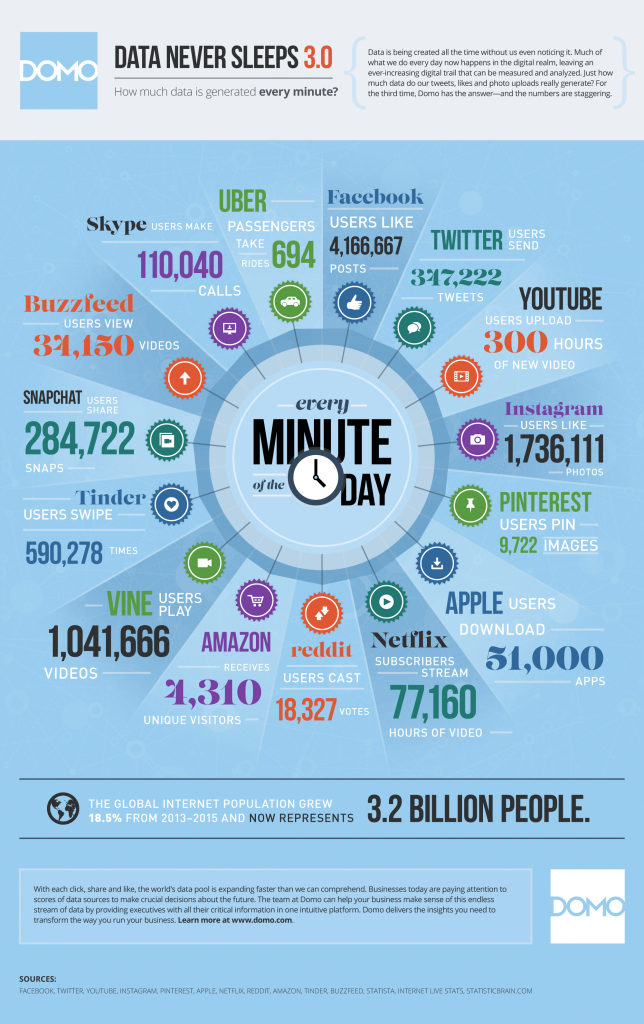
It allows corporations to make sense out of the sea of bits and figure out how the stocks are going to perform next week or predict buying patterns for large retail stores. Each individual on the web leaves a digital footprint not only himself but also humans in general. Big data is the ability of systems to extract meaningful information from trillions of bytes. It involves the use of both structured and unstructured data.
Structured data usually involves information within files, sheets etc. This includes information associated with web pages such as meta tags, titles, header tags, hyperlinks etc. On the contrary unstructured data involves content such as untagged text, images, audio, video etc.
Artificial Intelligence and its role in content marketing
Artificial intelligence is the science behind the ability of computer systems to perform tasks that would normally require human intelligence to complete. It can also be perceived as the ability of a device or system to effectively monitor and evaluate its surrounding and take or recommend actions to improve the chances of achieving a goal.
Concepts such as machine learning and deep learning which mimic cognitive functions also fall under this domain. A few examples of AI system currently deployed in our daily lives include; human speech interpretation, driverless cars and drones, and personal virtual assistants. To learn more about these complex systems read “Role of Artificial Intelligence in Business Development”.

When it comes to content marketing, AI is knocking on the door just now. Tech startups have started to develop purpose-built software which tackles content related tasks. Take ContentStudio for example. It is developed to address a complex data-driven task, content discovery and it does that efficiently and seamlessly.
It utilizes complex machine learning algorithms to enable you to discover topic-relevant content filtered by social shares, different media types, and virality. This achieves a task that’s very time-intensive for humans, to make it more efficient and effective.
AI is able to perform any content related task that we currently do as digital marketers. Anything from shortlisting keywords, selecting blog topics, social content sharing, creating landing pages even developing websites. Everything we do that requires us to manually create a strategy or plan, develop content, and promote it can be automated or enhanced with artificial intelligence.
Which pain-points are addressed by content intelligence?
Content intelligence is not limited to what and how you share content but also whether or not you track the progress and engagement of your publishments. It is estimated that only eight percent of marketers consider themselves being able to track content marketing ROI and only 55 percent of bloggers regularly check analytics.
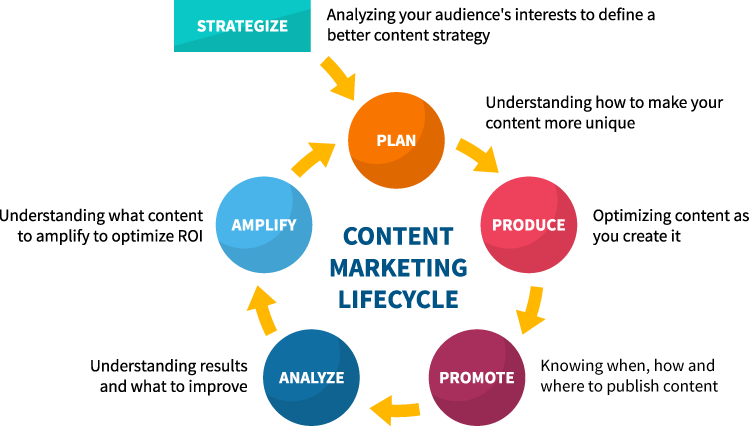
Let us explore what exact issues are solved by content intelligence.
Content distribution – what and how to Share
The world of content marketing is divided into two hemispheres. One represents high-quality engaging content and the other its marketing and distribution. For a successful content strategy, you need the best of both.
Currently, the decision pertaining to the distribution of content is restricted to intuition. This includes blogs, websites, social media, and advertisement. Content intelligence can reshape this entire process by utilizing consumer models and characterizing content from previous interactions to suggest what content to share on which medium.
This will allow content marketers to make better decisions on a large scale. Content intelligence can achieve personalized content sharing using suitable channels which us humans cannot perceive.
Audience Identification
Media giants such as Netflix and Spotify have started to present personalized data to their viewers. This is accomplished by intelligent systems making suggestion depending upon content history and search patterns.
With content intelligence at hand, these corporations are able to identify the interest of their customer by analyzing browsing history, their position in an organization, job title, what they and other people in the same organization have consumed in the past.
These are some of the factors that content intelligence utilizes in evaluating audience and content determination. Apart from these, there are hundreds of such factors that can be intelligently fed into algorithms and exactly know what context something has and what the right piece of content is.
Know which content to update re-share and when
There are millions of articles being published each year on the web. A selected few of them perform good, even fewer go viral. Say you wrote a content piece and it performed really well. Wouldn’t it be nice to receive a notification from the article itself to be shared or reposted?
Applying this knowledge the concept of evergreen content will be a thing of the past. In addition to that content, intelligence can advise you to add more headlines, image or content to further improve the engagement statistics. This would be a great addition in the arsenal of a content marketer for scalable promotion.
This will also be great in the evaluation of the writer. With continuous feedback coming in every week or month on the posts, you can self-evaluate to recognize which areas need more improvement.
Content intelligence will allow you to do this throughout funnel stages, your website, a salesperson on the phone, or emailing with a prospect. Any time you have a touch point with a customer, you can show targeted information that’s highly valuable to them.
How content intelligence can be applied to marketing
There is one common goal for all content marketer and that is to generate high-quality leads that drive sales. Apart from creating good quality content to engage the audience, generating business through content is a must for all writers.

There are many ways utilizing content intelligence can help marketers meet their most common targets.
Traffic
A steady stream of traffic is the primary source of lead generation. This forms the foundation of inbound marketing. Web page analytics allow you to monitor traffic statics and identify bottlenecks in the conversion process. Content intelligence takes it up a notch.
In order to increase traffic and click through rate, marketing professionals can segregate what type of content drives more traffic and the reason behind it. By digging deep in the content history, performance metrics can be created to educate marketers on how to generate more traffic.
The same concept can be applied to social media engagement data. This guides the publishers on what new content to create with the goal of driving more traffic, hence generating more leads.
Generating genuine leads
The ultimate goal of a healthy web traffic is to convert visitors into clients. Content intelligence plays its part by ensuring visitors move through conversion funnels like a hot knife through butter. This is achieved with the aid of live chats and pop-ups.
Accessing the flow patterns of visitors, content intelligence can advise visitors to interact with a highly intelligent chatbot. This instills confidence in the visitors by answering their queries, receiving product recommendations and encouraging them to complete the sale.
The above interactive process can also be used to better train the content AI system for the future.
Another way to embed content intelligence practices for generating leads is the use of Pop-ups. Using a program that understands the patterns of the visitor with the website and then triggers corresponding pop-ups can increase the rate of conversion.
Conversion optimization
Conversions optimization is highly dependent on data analysis. Questions such as social media visitors, who purchased? ROI of email marketing? How long does it take for users to move through the marketing funnel? Conversion bottlenecks? All these queries can be answered by content intelligence
Content Intelligence helps marketers understand these concerns and then device appropriate strategies to counter them e.g. providing value-added personalized content to ease the decision making of visitors.
Client retention
Content intelligence can play a huge role in client retention as well as upselling. When properly deployed it helps to connect the dots, instill brand loyalty, and pave the way for repeat purchases. Much of this can happen with the offering of discounts and incentives.
Using concrete data interpretation using sophisticated algorithms, content intelligence can eliminate guesswork for marketers. Suggesting ideal discount prices, the need for buzzwords within sales pages and repetition of particular phrases are of many techniques which can improve client retention.
Benefiting from the data to achieve more
Content intelligence relies primarily on data computation to work. This means the insights it provides are only as good as the amount and quality of the data you have. To leverage this technology for competitive advantage requires as long a history as possible of well-structured, well-maintained, trustworthy data. The first step to ensuring you have good data is to conduct a comprehensive content audit (which should be performed once a year, regardless) and implement an organized tagging and categorization system for all your content.
Content intelligence can solve a wide range of content marketing problems. These include alleviating time constraints, resource shortages, strategy uncertainty, stresses data computation, and content recommendations.
Examples of CI in the content marketing
Now that we have understood what content intelligence is and what benefits we can yield from it, let’s see how some business are using it to their advantage.
Personalized training offers from Under Armour
Under Armour is an American company that manufactures footwear, sports, and casual apparel. They also offer training advice and meal plans. By collaborating with IBM, they have managed to generate customized content for their customers.

Using their app and data gathered from third party sources, they advise clients on topics like fitness and nutrition. Take for example if a person is training to run a marathon, Under Armour app will create a personalized training and meal plan to help her improve her diet and performance.
Creating clothing stores from screenshots
Social platforms like Instagram have created the desire to buy what they see in screenshots/ pictures especially when the item in question is clothing. ScreenShop lets you do exactly that.
This app converts screenshots into shoppable items creating a virtual store in the process.

Users take screenshots of Instagram photos they want to buy an item from and upload them into the app which then translates them into shopping results for similar items of clothing.
Identifying and sharing viral posts – HUE
To be a successful content marketer, one must have the eye for engaging content. This process can prove to be difficult at times, but TINT’s feature HUE makes that process a whole lot easier.
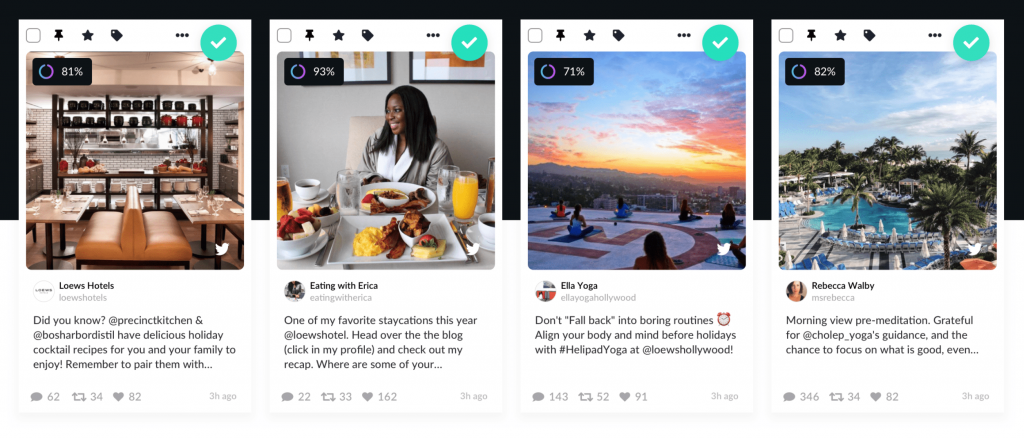
This tools analyzes consumer content and determines which articles are the most compelling for a particular set of audience. It also makes intelligent content suggestions to keep you hooked on quality content. It uses a deep-learning algorithm to unlock audience insights.
Conclusion
Consumers are looking for more and more authentic experiences to engage with their brands and content is the perfect way to engage them. With content intelligence at hand, businesses can fulfill them attain loyalty in return.
CI is progressing with time. Companies have started to use the data available and merge it with internal sources to create detailed insights for their audience.
On the flipside content marketing still remains an inherently creative process, and requires innovation from human beings. But unskilled parts of the process, like data-mining and automation, will continue to feed into the ever-evolving world of CI.
Recommended for you
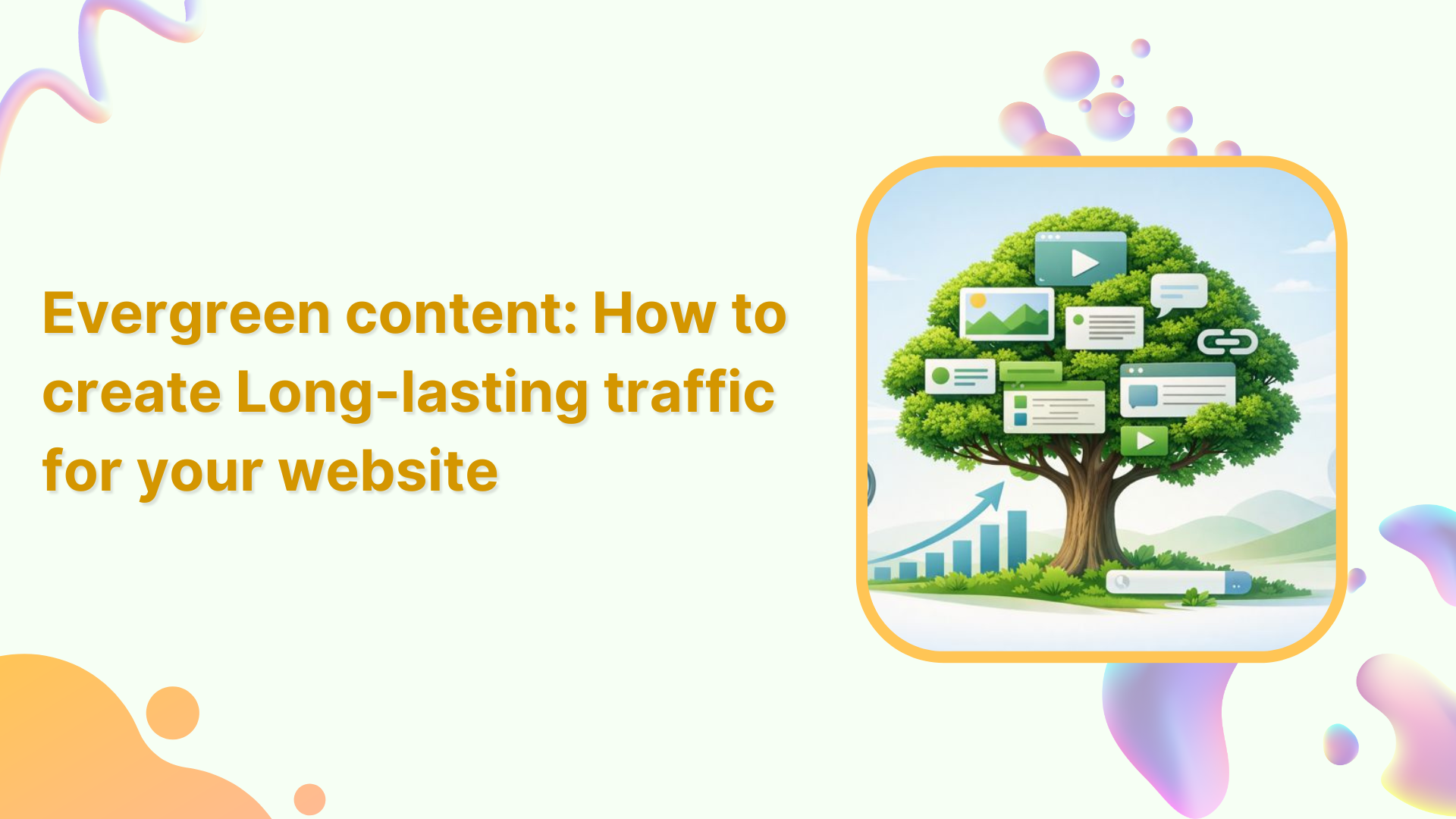
Evergreen content: How to create Long-lasting traffic for your website
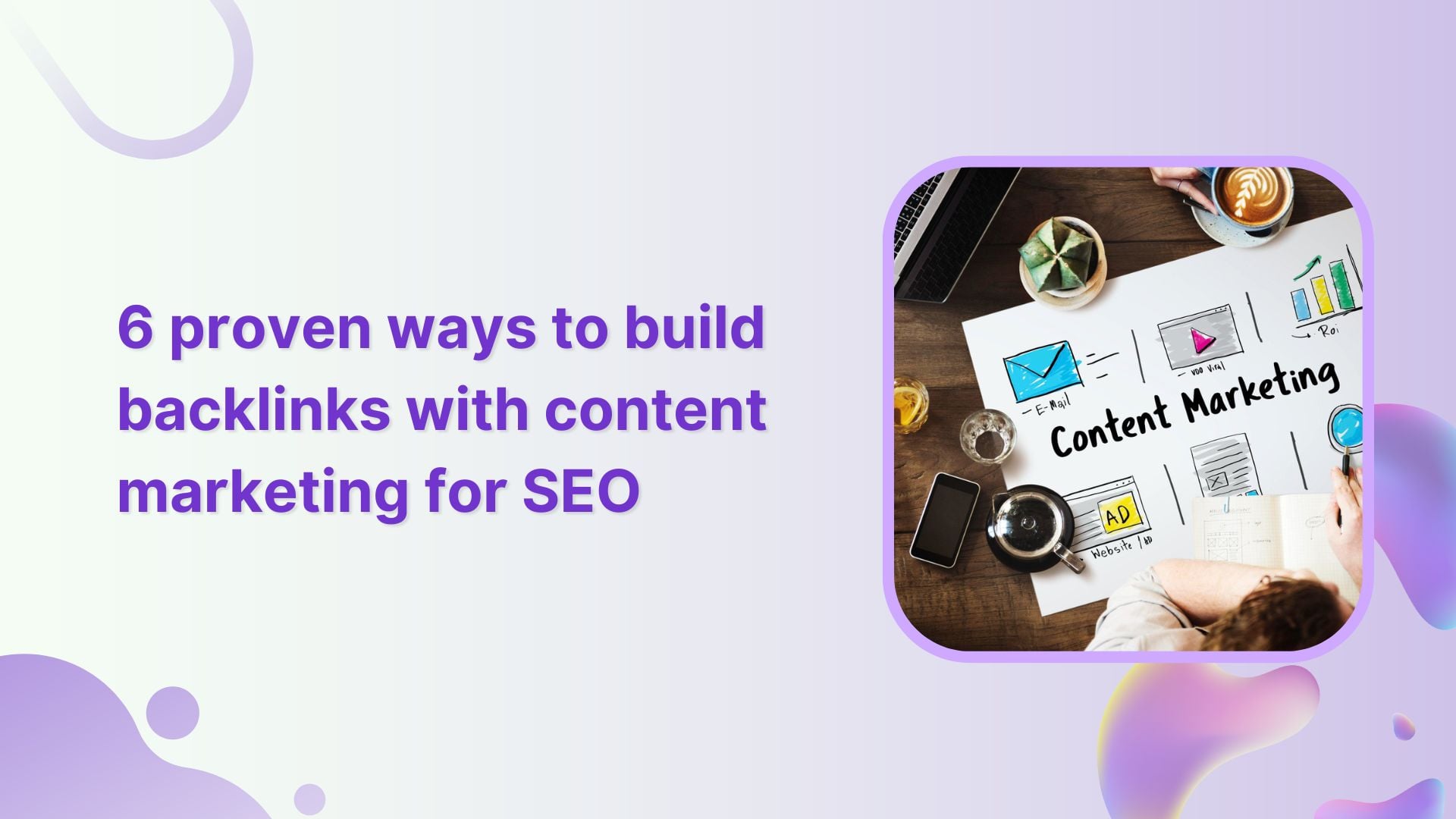
6 proven ways to build backlinks with content marketing for SEO


Powerful social media management software
14-day free trial - No credit card required.

